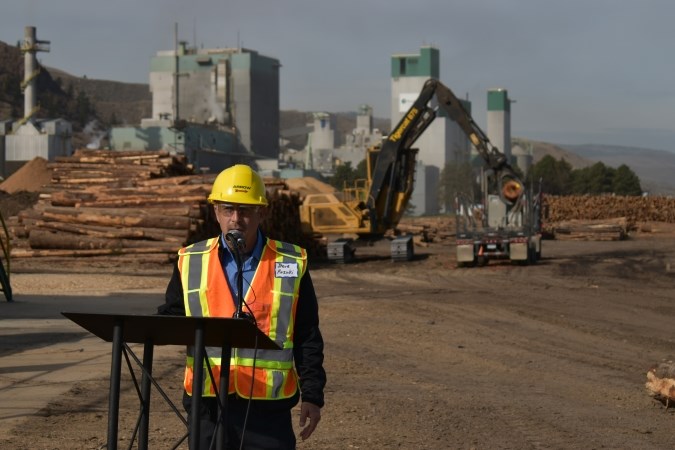
Steve Kozuki of the Forest Enhancement Society of BC spoke at a Sept. 12, 2023, press conference announcing millions in funding for forestry projects that will reclaim burnt wood and slash piles for pulp across the province.
(LEVI LANDRY / iNFOnews.ca)
September 18, 2023 - 7:00 AM
All that wood left behind in burnt BC forests is beginning to find new life in the logging industry as companies reclaim it for a Kamloops mill.
The Kruger Inc. pulp mill in Kamloops is now taking chips from burnt timber and repurposing it for its own products or burning it for energy with its on-site incinerator.
Normally this isn't done after a wildfire tears through what might have become a cut block, but new funding from the Forest Enhancement Society of BC is helping a First Nations-owned logging company reclaim the timber.
The Crown agency announced the project on Sept. 12, which is funding Simpcw Resource Group, among others, to take on the work of reclaiming the previously-unused wood.
Both burnt wood and "low value logs" that might have been left in the forest are being shipped to River City Fibre in Kamloops to breakdown for pulp, according to the Forest Enhancement Society.
READ MORE: iN VIDEO: Lack of official info about McDougall Creek wildfire led to terror on Westside Road
"With challenges such as insect epidemics, devastating wildfires and the need to conserve old growth and wildlife habitat, it is crucial to find innovative solutions," society executive director Steve Kozuki said. "The declining timber supply has amplified the importance of utilizing leftover forest fibre that would have otherwise gone to waste."
The Crown agency awarded $2.3 million for Simpcw Resources to reclaim the wood.
Once logs are cut from a burnt cut block, or a slash pile is reclaimed, it's transported to a chipping facility like River City Fibre. River City then debarks the logs before they're dropped onto a conveyor system to be ground into chips.
Bark and smaller chips are separated into a pile for the Kruger incinerator, while the larger chips are used for mill inventory as it uses the wood to make pulp products.
READ MORE: Developer sues City of Kelowna for stalled controversial downtown highrise
Kozuki said the money, which is part of a total $50 million in funding to projects across the province, will be used to kickstart work logging companies might not have explored before. He told iNFOnews.ca it's hoped forestry companies can use the money to transition into using timber that would have been left behind in the past.
A total 42 projects are getting a piece of the $50 million pool, with at least four aimed at bringing low-quality or burnt wood to River City Fibre in Kamloops. Once there, the logs will be chipped then separated for use at Kruger's mill across the road.
Wood chips not used for pulp products are burnt for energy at the Kruger incinerator, which Kozuki said produces less harmful emissions than it would if the wood burnt in a wildfire.
"We're definitely in a transition period in the forestry sector. Take a look around at all the fires that have occurred and the changes we see from climate change," Kruger fibre manager Tom Hoffman said. "It's a program designed to take wood from the forest that allows the forest to be silviculturally treated and come back as a green, vibrant forest."
READ MORE: Cows could be newest tool in Kelowna's wildfire mitigation efforts
The new fibre supply is not only aimed at helping BC forests, but it also gives Kruger new inventory after facing a domino-effect of challenges from mill closures across the province.
A company spokesperson told iNFOnews.ca the situation was "serious" earlier this year as its inventory reserves or raw material dropped to a 15-day stockpile from its typical 60-day reserve.
The mill typically uses unusable wood from BC sawmills, but closures and curtailments at other facilities put pressure on Kruger. Spokesperson Paule Veilleux-Turcotte, however, said Kruger would partner with other organizations to find long-term solutions to the provincial fibre shortage. Burnt and unused wood appears to be giving the mill new supply that can counter that shortage.
Just how much of the province's burnt forests can be licensed and reclaimed isn't clear. If forestry companies find it economically viable to continue reclaiming burnt wood without Crown agency funding, it would take years to make a dent in the swaths of fire-damaged forests across BC.
This year, the province blew passed the previous record of total land burnt by wildfires, measuring at more than two million hectares. The previous record was in 2018 when 1.3 million hectares burnt.
To contact a reporter for this story, email Levi Landry or call 250-819-3723 or email the editor. You can also submit photos, videos or news tips to the newsroom and be entered to win a monthly prize draw.
We welcome your comments and opinions on our stories but play nice. We won't censor or delete comments unless they contain off-topic statements or links, unnecessary vulgarity, false facts, spam or obviously fake profiles. If you have any concerns about what you see in comments, email the editor in the link above. SUBSCRIBE to our awesome newsletter here.
News from © iNFOnews, 2023